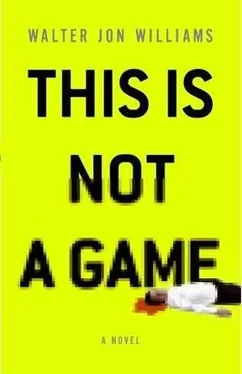“Yes,” Dagmar said. “Thank you.”
She pushed the door open all the way and stepped onto the sidewalk. Afternoon heat shimmered up around her: the atmosphere seemed scarcely more breathable than the close air in the stairwell. The young man bustled up around Putri and took Dagmar’s bag, then waited expectantly for the knapsack. Dagmar shrugged out of the shoulder straps and handed the computer ruck to him. He put both in the trunk and slammed the lid.
Dagmar stepped into the car. It smelled of tobacco, cloves, and hot plastic. One of the young men, very polite, closed the door for her.
Putri trotted around the car and joined Dagmar in the backseat. The older man gave a quiet command and the others ran into their cars. The three vehicles made U-turns and sped away.
Dagmar looked over her shoulder to see the Royal Jakarta receding.
Putri was still smiling at her.
“Where are you from?” the girl asked.
Dagmar laughed and told her.
FROM: Desi
My friend Eric tells me that Bayangan means “phantom” or
“shadow,” and that Prajurit is “warrior.” So the Bayangan Prajurit
are Phantom Warriors. Pretty cool, huh?
FROM: Hanseatic
Phantom Warriors? Are they like Indonesian ninjas or what?
FROM: Desi
I don’t think so. I think it’s just one of those elaborate names that
martial artists use, like Golden Crane White Tiger Long Fist Kung
Fu. But I could be wrong.
The Bayangan Prajurit convoy avoided the highways and worked their way east and north in short legs, sometimes back-tracking when they didn’t like the look of an area. The older man, whose name, according to Putri, was Mr. Abu Bakar, was on his cell phone continuously-negotiating, Putri said, with groups that controlled the neighborhoods they were passing through.
When they had to take an overpass over a highway, or a bridge across one of the city’s many canals, one car was sent forward to scout, to make certain there was no ambush. Some of the bridges had roadblocks on them, cars drawn across the roadway, and then Abu Bakar came forward to negotiate. Sometimes they were turned away and had to find an alternate route. On other occasions, Abu Bakar paid a toll with sacks of rice that were carried in the lead vehicle.
Jakarta was like Los Angeles in a way, a series of small towns blended together. Some areas featured tall glass office buildings or apartments; some had private homes; some had apartment buildings clustered together. The homes were quiet; businesses were shuttered.
Everywhere there was greenery. The Jakartans liked living among trees.
Or perhaps, in the tropics, you couldn’t keep the green from springing up.
Only in the poor areas, the kampungs, were numbers of people seen-their apartments were too small for anything but sleeping, so life had to be lived in the open whether there was a political and economic crisis or not. The destruction of the currency had hit the rich and the middle classes, but the poor had no savings to lose. What they had lost were jobs: in the streets, Dagmar saw people who would normally have been at work playing football or standing in groups or gambling with whatever passed for currency in an economy where the money had become so much toilet paper.
On one occasion she saw them engaged in a sport that looked like volleyball played with the feet, kicking sometimes from a hand-stand position. The game was fascinating, but the car raced by too quickly for Dagmar to get a good look.
She got on her handheld and sent a message to LadyDayFan, Charlie, and Tomer Zan that she was on her way.
No one tried to stop her from sending the message. If they were kidnappers, she thought hopefully, they would have kept her from communicating.
After two hours of transit, the convoy drew up before a canal, one equipped with a drawbridge of the same type Dagmar had seen in Amsterdam. The drawbridge was up but came down as soon as the cars appeared. Children playing in the canal stared from the water as the cars crossed.
Abu Bakar put down his cell phone for the first time. He turned around in his seat and looked at Dagmar.
“You okay?” he said.
“Okay,” she said.
He gave her an encouraging smile, then faced forward again. Dagmar guessed he had pretty well exhausted his English.
The convoy passed over the bridge, between two shabby canal-side warehouses with red tile roofs, and into a residential area. The principal streets were laid out in a grid, but the smaller streets, very narrow, crept and zigzagged between apartment blocks. There were bright plastic awnings, lines hung with laundry, flags, umbrellas-anything, Dagmar suspected, to provide shade. Broken plaster showed that the buildings were made of red brick, with roofs of metal or worn red tile. The structures were old and sagged a bit, sinking into the soft ground. Zigzag cracks demonstrated that bricks were a very poor construction material in an earthquake zone. The tile roofs often had green plants, and even small bushes, sprouting from the crumbling red clay.
The vehicles passed a small neighborhood mosque and drew up in front of a long building. The brick walls had been plastered and painted white, with neat, bright blue and red lettering. Dagmar recognized “Bayangan Prajurit” amid other words she didn’t know.
Doors opened. Abu Bakar opened Dagmar’s door, and said, “Please.”
The building turned out to be the group’s training hall. The place was scrupulously clean. Racks for weapons stood along the walls, half of them empty. A large photo of a distinguished-looking man, perhaps the style’s founder, stood on one wall between a pair of Indonesian flags.
A group of women sat on a raised platform at one end of the room. Cooking smells brightened the air. Dagmar felt her mouth begin to water.
Dagmar removed her shoes at the entrance along with the others. The boy in the wife-beater shirt brought in her baggage and placed it by the door.
Dagmar looked at the springy split-bamboo floor, ideal for percussive exercise, and reflected that in Los Angeles, fashionable homeowners would have paid a lot of money for a floor just like this one.
She turned to Putri. “How long are we staying here?”
“Till the boat comes. The boat won’t come till night.”
“How will we know when the boat arrives?”
“The captain will call on his phone.”
On his satellite phone. Of course.
“Please,” said Putri, waving a hand in the direction of the circle of women. “We thought you might want to eat.”
“Thank you!”
Dagmar approached the platform eagerly. The women looked up at her-they were young girls in their teens under the direction of an older woman, and they had prepared a large pot of rice and a number of other dishes set in a circle around the rice bowl.
One of the girls gave Dagmar a bowl, and she was prepared to seat herself with the others when a thought struck her. She turned to Putri.
“Food must be scarce here,” she said. “I don’t want to take anyone’s food.”
Putri absorbed this, then nodded.
“That is kind of you,” she said. “But in our kampung we have food. One of those gudangs we passed-storage places?”
“Warehouses?”
“Yes. Warehouses. One of the gudangs was full of rice. So now we have a lot of rice, and the head man of our kampung can trade this rice for other kinds of food.” She smiled. “So we are poor here, but not starving.”
“Is Abu Bakar the head man?”
“No. That is Mr. Billy the Kid. You may meet him later.”
Dagmar was hungry but couldn’t keep the question from her lips.
“Billy the Kid? Is that a name his English teacher gave him?”
“No,” Putri said patiently, “it’s his Indonesian name. American names are very popular here, and Mr. Billy the Kid was named after a character played by Paul Newman in the cinema.”
Читать дальше











